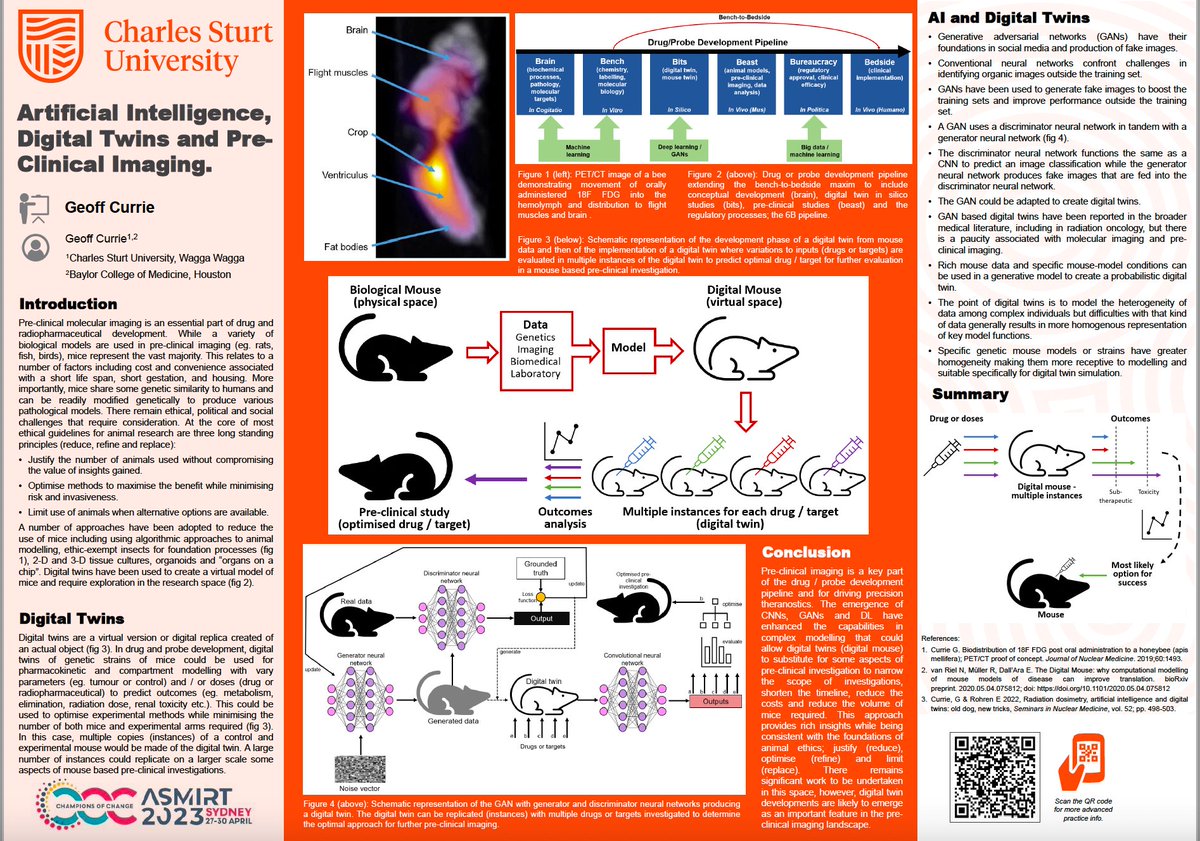A thread now to catch up on discussions around artificial intelligence (AI) - a hot topic everywhere, including at #ASMIRT2023.
See some of the issues raised in our 'future of medical radiation sciences' Q&A piece
croakey.org/what-does-the-… #ASMIRT2023
See some of the issues raised in our 'future of medical radiation sciences' Q&A piece
croakey.org/what-does-the-… #ASMIRT2023
Interestingly, @theage @smh have run a piece this weekend by @angusthomson_: 'A new breed of AI is changing healthcare. But it comes with a warning '
($ paywall) #ASMIRT2023
theage.com.au/national/a-new…
($ paywall) #ASMIRT2023
theage.com.au/national/a-new…
It quotes an Aust study of safety events involving AI-assisted tech (reported to @US_FDA) by @AIHI_MQ led by @EnricoCoiera @David_Lyell @YingWang_CHI @FarahMagrabi who warn "we just need to be taking the safety of these systems really seriously"
(ML = machine led)
(ML = machine led)

Here's the link to the @AIHI_MQ @FarahMagrabi @EnricoCoiera @YingWang_CHI @David_Lyell study published in Journal of the American Medical Informatics Association
academic.oup.com/jamia/advance-…
academic.oup.com/jamia/advance-…
#ASMIRT2023 speakers are also raising both risks and potential for AI:
"There are big opportunities on the interaction between AI and person-centred care, but we need to get the balance right." @CMalamateniou
"There are big opportunities on the interaction between AI and person-centred care, but we need to get the balance right." @CMalamateniou

. @DrKEHawk says scientists and healthcare professionals hold a special responsibility to take the lead on the design and advance of AI - and critically to ensure that diversity (patients/community/workforce) at the heart of design #ASMIRT2023
. @DrKEHawk has delivered a number of presentations at #ASMIRT2023, incl
- Recent innovations in nuclear neuro imaging
- Ethical and healthcare equity aspects of artificial intelligence in medical imaging
- Recent innovations in nuclear neuro imaging
- Ethical and healthcare equity aspects of artificial intelligence in medical imaging

AI applications have the potential to produce “more meaningful human interactions and to lessen healthcare inequity” but currently its transformative potential is "constrained by its design process". @DrKEHawk told #ASMIRT2023
Speaking also to Croakey, @DrKEHawk said: AI design for health care can't be left purely to the hands of a business world that does not have a health lens, doesn't know nuances of “the sacred patient-physician relationship or how care impacts patients’ lives”: #ASMIRT2023
Physicians, scientists and healthcare providers need to make sure AI tools are designed in a way that “betters our art of medicine": @DrKEHawk #ASMIRT2023
. @DrKEHawk says the health system has to ask a range of important questions around AI design, incl who was involved, who was it for, who provided the funding, and who is the patient population involved? (more on this in our upcoming story) #ASMIRT2023
This leads into @DrKEHawk's call to arms on diversity/inclusion in AI design (she cites this study: pubmed.ncbi.nlm.nih.gov/24993534/) #ASMIRT2023
On the need for AI to reflect human diversity, @DrKEHawk speaks of the US, one of the most diverse societies in human history. Some long for its differences to be gradually assimilated/blended together into a homogeneous citizenry, "a great melting pot" #ASMIRT2023
A more fitting metaphor, says @DrKEHawk, promulgated by Jimmy Carter, may be that of a mosaic, or a salad bowl, containing complementary but unamalgamated ingredients. #diversity #ASMIRT2023
“Creating a tool from a design process that fundamentally lacks diversity could ultimately result in an AI solution that deepens healthcare inequities in clinical practice," @DrKEHawk warns #ASMIRT2023 - risks for patients & clinicians
#ASMIRT2023 AI speakers @DrEMRohren @DrKEHawk & @DrGeoffCurrie have collaborated in research/writing on ethical and legal challenges of AI in nuclear medicine sciencedirect.com/science/articl…
As does European Association of Nuclear Medicine position paper on the application of AI in nuclear medicine #ASMIRT2023 

. @DrKEHawk's slide above features "an old tattered scroll”, the Hippocratic Oath, which she told Croakey can and needs to guide AI as much as it has the profession in every new technology. The ethical challenge is “nothing new to us” #ASMIRT2023
. @DrGeoffCurrie also spoke to Croakey of his excitement re tech advances like theranostics, hybrid scanners, AI and targeted radiopharmacy, which "all allow earlier detection, more accurate diagnosis, improved treatment planning, and early response to therapy". #ASMIRT2023
Advances in nuclear medicine (AI, hybrid tech, radiopharmaceuticals, theranostics) are exciting, create amazing career opportunities, unique opportunity for patient-centred care in a precision medicine environment @DrGeoffCurrie #ASMIRT2023
Poster on AI: the role in supporting person-centred care from @DrGeoffCurrie @DrEMRohren @DrKEHawk #ASMIRT2023 

Also @DrGeoffCurrie poster on: Artificial Intelligence, Digital Twins and Pre-Clinical Imaging #ASMIRT2023 

• • •
Missing some Tweet in this thread? You can try to
force a refresh

 Read on Twitter
Read on Twitter











